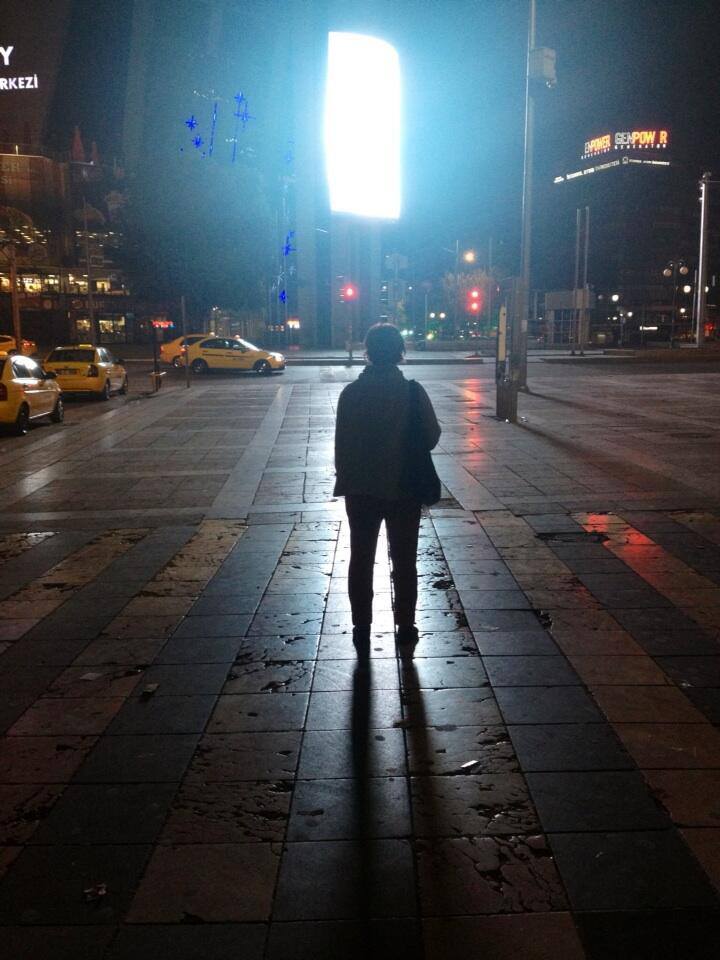.jpg)
“In Ankara, a #standingwoman surfaces. She is standing in Kizilay Sq, where Ethem Sarisuluk was shot dead by the police.” Across Turkey, individuals are standing, facing, moving while perfectly still. #duranadam. It means, “standing man.”
Revolutions change our language. How many around the world knew of Tahrir before the Egyptian uprisings? Now, we all do. It’s a gift Egyptians have given to the world.
The democracy and social movements across Turkey have given us Gezi, Taksim, and now #duranadam. This is part of the inherent creativity of people in movement.
The State has responded with predictable, moribund redundancies. First, it tried to criminalize the protesters. Then it claimed they were foreign agents. Then it tried to claim they were only a dissident, spoiled fringe minority. This is textbook `Statecraft’ at its emptiest.
Then the State sent in the police, to `clear’ the parks, to `reclaim’ the commons in the name of `the people’. Familiar, no?
Today’s news is filled with the predictable: “Turkey arrests dozens in crackdown”; “scores detained”; “dozens detained.”
Behind the `niceties’ of detention and arrest stands the prison. Turkish prisons are notorious for their human rights violations and abysmal conditions. On October 20, 2000, Turkey “gave” to the world the longest and deadliest hunger strike in modern history. Across Turkey, for three years, prisoners fasted, and died, protesting the construction of F-Type prisons, which are basically supermax. Across Turkey, women prisoners went on hunger strike, `even though’ women prisoners weren’t sent to F-Type prisons. In Turkey, solidarity is not a new phenomenon. Neither is standing, seemingly alone and yet decidedly with others.
Since then, hunger strikes, by prisoners and others, have become a regular part of the Turkish political landscape. Last September 60 or so Kurdish prisoners went on hunger strike. By the end of the strike, close to 70 days later, close to 700 prisoners had joined the strike, plus untold others across the country and even around the world.
At the same time, sexual violence, rape, and torture also form a part of the Turkish political landscape that emerges from and returns to prison. Women, like Hamdiye Aslan and Asiye Zeybek, have reported on the extreme and continuous violence they suffered. For more than a decade, national and international groups have documented this. Little to nothing has changed.
Some things have changed. In 2002, there were 55,000 people in Turkish prisons and jails. In early May, there were more than 130,000. Health care in the prisons has gone from bad to criminally worse, as acknowledged recently by none other than Recep Tayyip Erdogan.
In October 2011, Ayşe Berktay, writer, translator, peace and justice activist, pro-Kurdish activist, was arrested. She’s still in prison, two years later. In December 2011, Berktay wrote from Bakirköy Women’s Prison: “The situation here is rather critical. Feeling ever more powerful with the support he is getting from `Western powers’ as a representative of so-called `Western ideals of democracy and freedom’ in the region, Erdoğan has turned his back on—or done away with—all semblance of democracy at home and is preparing to intervene actively in the region. Your action is valuable in the sense that it exposes the true nature of the Erdoğan government…He feeds on this `democratic prestige’ he has abroad to take harsher measures against democratic opposition at home. Such prestige makes his hand stronger against opposition in the country. Anyone who does not agree or go along with his way of solving the problem is a terrorist, an enemy—familiar, no?”
Familiar, no?
This morning, Rumeysa Kiger, a journalist who had been part of the delegation that met with Erdoğan last week, was arrested. According to her husband, she was on the way to an interview when she saw police arresting protesters. She went to object and was herself arrested. Familiar, no?
As Berktay concluded, two years ago, “Protests against this anti-democratic obstruction of political struggle and the arbitrary nature of the detentions, against arbitrary detentions to obstruct political struggle and democratic opposition, are very important. They need to know that the world knows and follows.”
One man standing. One woman standing. Thousands of women and men standing, in prisons, parks, squares, and streets. Extraordinary, no?
(Photo Credit: http://www.ayresmendevrim.com/2013/07/dunyadan-ve-turkiyeden-duranadam.html)